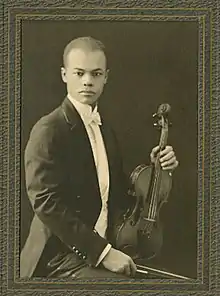Wesley Howard
Wesley Isaac Howard (February 1, 1892 - 1962) was a violinist and professor in charge of the violin and ensemble departments at the Howard University Conservatory of Music from 1921-1927.[1][2]
Wesley Howard | |
|---|---|
 Studio portrait of Wesley Howard from 1921 | |
| Born | February 1, 1892 |
| Died | 1962 |
| Occupation | professor, classical musician |
Howard attended the New England Conservatory of Music, graduating in 1916.[3] He was an assistant band leader in the 809th Pioneer Infantry in World War One.[4][5] He returned to study abroad in 1921 and received a certificate of commendation from Maurice Hayot at École Normale de Musique de Paris.[2]
He played for five years in two different white symphony orchestras and managed the orchestra at the Hampton Institute.[4]:384–385 He was awarded a Wanamaker Music Contest prize in 1927 and played with Roland Hayes for several seasons.[4]:274[6]
Personal life
Howard was born in Springfield, Ohio to Preston Howard and Mary Thomas.[7] He moved to Richmond, Indiana when he was six years old.[8] He married Harriet Nelson in 1920.[7]
References
- Dyson, Walter (1941). Howard University, the capstone of negro education : a history. Washington, D.C.: Graduate School, Howard University. p. 135. Retrieved 22 January 2019.
- "Howard, Wesley". Digital Library of Georgia. 1921-07-25. Retrieved 2019-01-22.
- The Crisis. The Crisis Publishing Company, Inc. November 1916. p. 28. Retrieved 2019-01-22.
- Cuney-Hare, Maud (1936). NEGRO MUSICIANS AND THEIR MUSIC. Retrieved 22 January 2019.
- Lefferts, PM. "Black US Army Bands and Their Bandmasters in World War I". DigitalCommons@University of Nebraska - Lincoln. University of Nebraska. Retrieved 22 January 2019.
- "Letter from Wesley Howard to Augustus Granville Dill, April 30, 1925". W. E. B. Du Bois Papers. Special Collections and University Archives University of Massachusetts Amherst. Retrieved 22 January 2019.
- "Ohio, County Marriages, 1789-2013". FamilySearch. Intellectual Reserve, Inc. Retrieved 22 January 2019.
- "Violinist will play at benefit". The Richmond palladium and sun-telegram. (Vol 42 No. 32). December 19, 1916. Retrieved 22 January 2019.